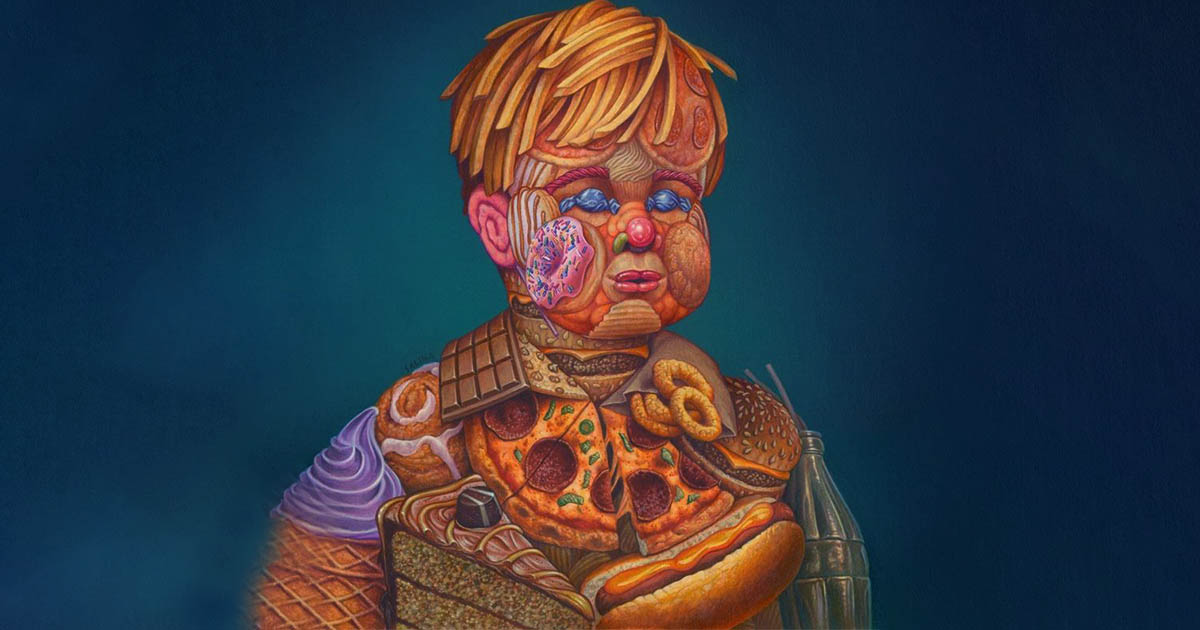Exploring the underlying causes of childhood obesity unveils a complex interplay of factors influencing the health and well-being of our youngest generation.
With its prevalence steadily increasing in recent years, understanding the root causes and implementing effective prevention and intervention strategies are paramount.
In this article, we delve into the common causes of childhood obesity, exploring factors ranging from dietary habits and sedentary lifestyles to environmental influences and socio-cultural norms.
By examining the multifaceted nature of childhood obesity, we aim to shed light on the interconnected factors contributing to its rise and offer insights into how we can address this critical issue.
What Is Childhood Obesity
Childhood obesity is an excessive accumulation of body fat in children and young people. It is based on calculating the child’s weight to height, age, and sex using the Body Mass Index (BMI). A child is usually classified as obese if their BMI lies at or above the 95th percentile for children of the same age and sex.

One study, for instance, found that males have a threshold of about 25% body fat while females have a threshold of 30%. CDC defines overweight as equal to or greater than the 95th percentile of BMI for age with “at risk for overweight” lying between the 85th and 95th percentiles.
Nevertheless, its prevalence is quite high. About fourteen point seven million children and adolescents or approximately nineteen point seven per cent are affected by what is termed as childhood obesity.
For instance, this varies among different age groups like those between two and five years who record 12.7 percent as compared to those between six and eleven years who come at 20.7% in contrast to those aged twelve through nineteen which awards them at least twenty-two point two percent.
Moreover, there are disparities among racial/ethnic categories such as Hispanics (26.2%), non-Hispanic Blacks (24.8%), non-Hispanic Whites (16.6%) and non-Hispanic Asians(9%) who demonstrate lower chances.
Meanwhile, healthy food choices can be addressed jointly in families or communities by individuals who need physical activity support e.g., walking paths safety plus health providers as well as policy makers’ involvement.
What Are Common Causes Of Childhood Obesity?
Childhood obesity is a multifaceted issue influenced by a variety of factors ranging from dietary habits to environmental conditions.
Understanding the common causes of childhood obesity is crucial for developing effective prevention and intervention strategies to address this growing public health concern.

Here are the causes of childhood obesity:
1. Sugary Beverages Consumption
When it comes to children’s obesity, sugary fluids are problematic since they contain low satiety levels but high calories and are found in the form of sodas, juices and other sweetened drinks. BMI is consistently linked with consumption of sugar drink among the kids as revealed by studies.
The caloric intake increases when these drinks are consumed in large amounts compared to solid food taken more slowly. This is aggravated by the fact that such drinks are mainly meant for children.
However, sugar-sweetened beverages like Coke alone do not cause obesity hence reducing the number of soft drinks children consume while encouraging them to replace these with healthier alternatives like milk and water would help.
2. Snack Foods
Though not directly causing overweightness, eating fattening snacks as in chips, baked foods and sweets can lead to a general increase in consumption of calories.
Furthermore, researches have shown that snacking alone is not linked with obesogenic individuals but when combined with other factors such as large portion sizes and physical inactivity it becomes alarming.
Therefore while some snacks may be alright if consumed in moderation, it is essential to encourage healthy options such as fruits vegetables nuts so as to prevent high caloric intake.
3. Portion Size:
The increment of portion sizes in the past ten years has led to excessive caloric intake by children. Oversized portions combined with frequent high calorie snacks lead to an energy imbalance that results to weight gain and obesity.
Kids, as a result, cannot control their own eating habits because huge sizes have become the norm or usual fare for them due to “supersized’ meals offered at restaurants as well as fast food joints and giant packages of snack foods.
Teaching children about correct serving sizes and promoting mindful eating can help reduce the impact of oversized meals on their overall calorie intake and body mass.
4. Sedentary Lifestyle:
One of the major causes of child obesity is sedentary lifestyles that involve sitting for long periods and minimal physical activity.
Screen time has increased significantly and this has led to children spending most of their time indoors engaging in sedentary activities such as watching TV, playing video games or using computers.
These acts not only diminish calorie consumption but also substitute the time which could be used for physical activities thus resulting into a higher overweight prevalence. Each day’s hour watching television raises the risk of obesity by 2% delineating why sedentary behaviors result in diseased weights.
Parents need to encourage their children to engage in regular exercise, minimize TV exposure, and allow them ample playtime so as to curb obesity associated with sedentariness.
5. Environmental and Socio-cultural Factors
By having limited access to safe outdoor spaces and neighborhoods, this can hinder children’s chances to exercise, leading to obesity.
Also, there are socio-cultural factors that influence the way children eat such as reward food behaviors as well as family meal patterns hence contributing to what is childhood obesity. The weight of their kids is heavily influenced by the things parents do such as activities they carry out and types of foodstuff at homes.
To encourage healthy eating behavior in young people, families must cooperate with policymakers and communities at all levels in order to create a conducive environment for change.
The root causes of childhood obesity require a holistic approach which considers both individual actions and societal aspects including environmental, socio-cultural as well as familial factors.
Thus we need to know its causes and symptoms so that we can prevent or manage it among our children since it affects their health status thus making them have good life.
Common Childhood Obesity Symptoms To Look Out For
Identifying symptoms of children with obesity can be essential to early intervention and management.

The following are some common signs and childhood obesity symptoms are as follows:
1. High Body Mass:
Obesity in children is characterized by excessive body weight for age and height above the norm which is indicative of fat tissue accumulation on such areas as a round face, thickened neck, or an extended abdomen.
Hence, identifying these physical signs is important at this point so that timely intervention may be sought as one of the adverse effects of excess body weight includes several health complications not only in childhood but also later during adulthood.
2. Implications Concerning Health:
Childhood obesity significantly raises the chances of developing various diseases like; type 2 diabetes, high blood pressure, high cholesterol levels, asthma, sleep apnea, and joint problems among others.
These illnesses can have lasting consequences on a child’s well-being both physically and psychologically affecting their quality of life and general health outcomes.
Thus, understanding that there might be health implications associated with being overweight highlights the need to focus on preventive measures early in life and management strategies aimed at minimizing risks while enhancing good health status in children.
3. Human Activity and Surrounding Conditions:
Childhood obesity is a multifactorial disease, with genetic, behavioral, environmental, and socioeconomic factors all playing their part.
Unhealthy eating behaviors that entail the consumption of high energy-dense foods, fast foods, or sugar-sweetened beverages along with sedentary habits like watching TV for long periods contribute to weight gain.
Furthermore, environmental conditions such as the availability of healthy food options, safe spaces for outdoor activities, and socio-economic inequality are important determinants of children’s lifestyles and general health outcomes.
4. Psychological Impact:
Obesity in children has great psychological consequences including low self-esteem levels, body image dysmorphia, discrimination by others, and poor mental health. Obese or overweight children may also be victims of bullying or social rejection which further compromises their emotional well-being and mental stability.
Creating inclusive environments that promote positive body image, confidence and acceptance are crucial in fostering mental health in affected children who are obese.
5. Prevention and Intervention Strategies:
Preventing and tackling obesity in childhood demands collective, cross-cutting approaches in healthcare, schooling, communities, and policy circles.
Efficient strategies to avert the problem consist of nourishing knowledge programs aimed at the promotion of healthy eating habits; affordable nutritious foodstuff increase; comprehensive physical activity programs for schools and community; as well as supportive surroundings that encourage active living.
It is possible to decrease the frequency of childhood obesity and enhance health status for generations ahead by implementing evidence-based interventions at the levels of individuals, families, and communities.
A Word From Mind Family
Child obesity is a matter of concern, which needs our joint attention and action. Having examined the common causes of child obesity and discussed the strategies for its prevention and intervention, it becomes apparent that this problem must be addressed comprehensively taking into account multiple factors such as nutrition and environmental circumstances.
At Mind Family, we are determined to help families in their quest for good health and happiness.
Our goal is to educate families through lobbying or raising awareness about childhood obesity so that they can make informed decisions leading to healthier lives.
This will ensure that we bring up kids who will have bright futures with them enjoying all the happiness that life has to offer.
Frequently Asked Questions (FAQs)
1. What is childhood obesity?
Childhood obesity is a condition characterized by excessive body fat accumulation in children and adolescents, typically measured by comparing their weight to height, age, and sex using body mass index (BMI).
2. What are the causes of childhood obesity?
Causes of childhood obesity include factors like unhealthy eating habits, lack of physical activity, genetic predispositions, environmental influences, and socio-cultural norms.
3. What are some childhood obesity symptoms?
Childhood obesity symptoms include excessive body weight, increased body fat, difficulty with physical activities, breathing difficulties, joint pain, fatigue, and psychosocial effects like low self-esteem and depression.











